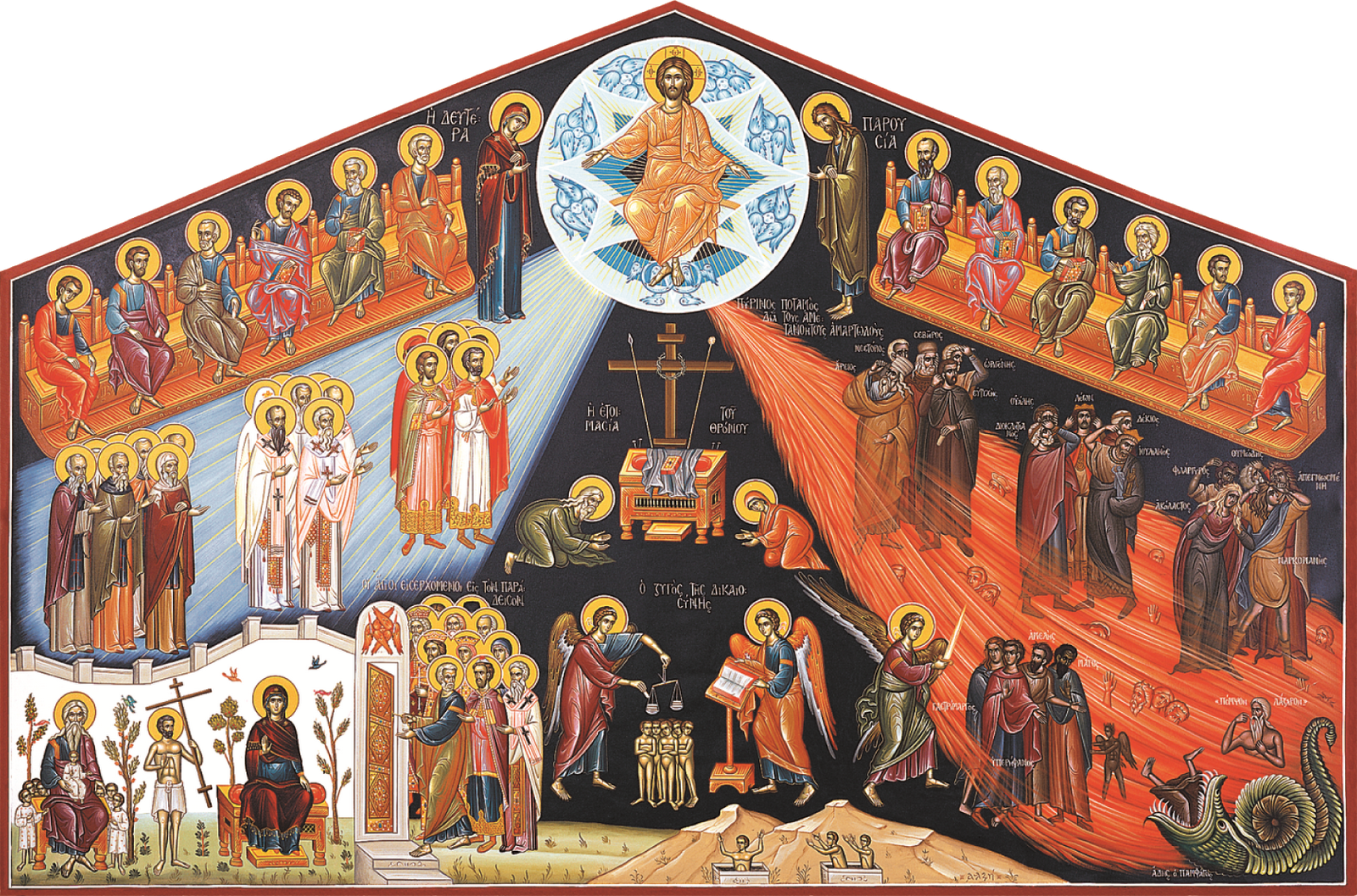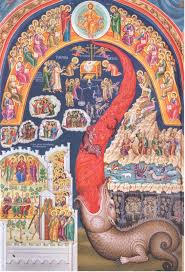The epistle pericope for today was from Romans 5. Specifically I want to get your opinion on this passage, particularly the bolded section:
So you'd say that we are saved by God's wrath not because God's wrath changes or ceases. In other words, God simply is. He's an all-consuming holy fire, I believe it says in Hebrews 12. So the difference between wrath and salvation is whether or not Christ's blood has been applied to us?
The western (or at least lutheran) understanding would be as follows: Jesus takes our punishment on the cross to pay our debts, as well as entirely fulfilling the Law. So we are clothed with Christ in our baptism and when the Father looks upon us, he sees us covered in Christ's righteousness and does not punish us, even though we are deserving of punishment for our sins.
Would you understand it like this: Jesus is God and thus is holy. Holiness is like a fire, so it can either burn us (Heb 12:18-24, Exodus 19) or purify us (1 Cor 3:10-15). God knows that his holiness will torment us if we are not "protected" so he sacrifices himself and clothes us with his blood (Gen 3:21, Gal 3:28), so that when we are exposed to the holiness of God we are already holy by virtue of Christ's blood?
In other words, we are saved from God's wrath and justified by Christ's blood by changing our response/disposition/preparation before God, not by turning away his wrath into love/mercy?
NOPE! Not at all. You just posted Lutheran Forensic Imputed Justification with a twist to it to make it sound more Orthodox.
Any idea of hiding in Jesus is Luther's idea, which was rejected by the Orthodox Patriarch of Constantinople when the German emissaries came to seek audience with him.
This is also a utter violation of covenant principles. In a covenant, which is a
relationship and not a contract!!!! (I can't begin to tell you how many people speak of the Covenant of God as a contract), you deal directly with the person and not through third-party agency. God exists in covenant, that is, the Blessed Trinity is a covenant of love between the three Persons of the Trinity. When Adam was created, he was created into that covenant in the same manner that a child is born into the already existing covenant relationship of love between his parents. We know this because A.) Adam is called "son of God" (Luke 3:38) and B.) because there was no covenant-making ritual between Adam and God in Eden which is similar to that which is seen in Genesis 15-17 with Abraham and God.
When Adam fell, the same love that Adam would feel as love from God would now be torment. The relationship is severed, not from any desire for vengeance on God's part, but from the torment of guilt upon Adam. (Orthodox authors I have read have said that the torment of hell is the guilt of our sins which makes God's love feel like burning fire rather than refreshing love.)
So what is the problem if all that has to be done is for God to forgive and Adam to accept? It is that our natures have been corrupted. This is why the Incarnation was essential. If it was just a matter of God saying "Okay. You apologized. I forgive." It would have been over in a heartbeat. But something much deeper happened that Western legal soteriology has lost track of - the broken nature of man.
As covenant head, Adam brought into man's very nature a disease called sin. It was therefore absolutely essential for Christ Jesus to be perfect man, to assume our nature, and to heal it by perfect obedience, for that which is not assumed is not healed (St. Athanasius, I believe). At the Fall, in Adam, we have been ontologically changed, and that for the worse.
Jesus Christ as the Covenant Head of the New Covenant does not offer us a "shield" or "covering" for our sins. He offers a New Covenant by means of which we enter into a new relationship with God, one that is mankind restored to union with God. When we enter into that covenant by baptism, we are united to Christ (Romans 6:3) and our nature begins to be healed, being joined to His nature. This is why the Fathers call the Eucharist "the medicine of immortality," because that healing of union with Him takes place at every Eucharist. This is hardly the same as ducking for cover under the shield of Christ's righteousness against a supposed anger that the impassable Father simply does not have. God is the same, yesterday, today, and tomorrow, and therefore is impassable. He is passionless. The use of the word "wrath" is tinged with human understanding which is trying to understand a
consequence of our ontological state rather than an emotion of God, which He does not have.
I think you meant
Galatians 3:27, because 3:28 makes no sense to this discussion. To "put on" Christ simply means that we are in union with Him as the Covenant Head. Let us go back to the analogy of marriage. When a woman unites to a man in marriage, she "puts on" his name and all that is particular to him in his existence. All that is of good and blessing which is his becomes hers. Likewise, she better hope he is not drunkard or given to physical abuse. His good name and reputation are joined to her
(These are absolute alien concepts in today's world!)
Our natural state in birth is to have Adam as our covenant head. Baptism makes Christ our Covenant Head in the New Covenant. We become the Bride of Christ.
When we come into the presence of He Who is Truth, all that we are ontologically will be exposed, no matter how well we have tried to hide it. Scripture says that the sins done in darkness will be shouted from the rooftops. There will be no place to hide. Those who have cooperated with God by repentance and ascesis, turning from sin to Christ, and have taken the medicine of immortality, will find that they are like Christ and the fire of His love will be a refreshing stream of love which will burn away any remaining dross of sin.
Those who, such as certain Catholic politicians who will not listen to the rebuke of the Church and continue to support abortion, will see their rebellion in full force. The guilt will be overwhelming, for they will know the truth of who they are essentially and what they have done. And that guilt, along with the reality of that which they are, will burn them because the fiery love of God destroys anything that is not like itself. That is hell. It is being changed into the image and likeness of Christ - theosis or deification - over eternity, as Matt said.
It is not being shielded by the Blood of Christ that protects us. What will "protect" us (if I can use your language for a second here) is that we have been
changed by the Medicine of Immortality. Faith produces changed ontology, not shields!
I hope this is helpful and I do thank you for your question.
BTW - in every Orthodox parish, over the door leading out to the narthex, is this icon. It is the Icon of the Last Judgment. It is there to remind us, as we go out into the world that hates us and will tempt us to wrong, that the Judgment will take place one day.
Look at it closely. Christ is the Judge, and flowing from Him is the stream of His love, a bright stream of light to those on His right (our left as we view) and a stream of purgative and painful fire to those on His left, the wicked.
But it is the same stream of love!!!!


